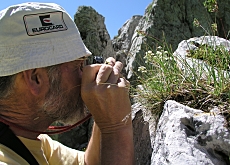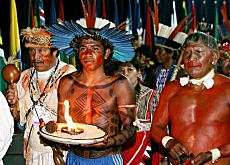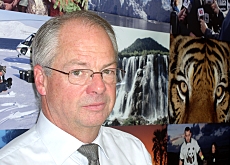Treaty nurtures plant biodiversity

A UN commission long supported by Switzerland is meeting in Madrid this week to discuss sustainable use of genetic resources for food and agriculture.
According to the UN Food and Agriculture Organization (FAO), the future of agriculture depends on international cooperation and on the open exchange of crops and crops’ genes.
The Commission on Genetic Resources for Food and Agriculture (CGRFA) is meeting for the first time and aims to ensure the conservation and sustainable use of genetic resources for food and agriculture, as well the fair distribution of benefits derived from their use.
“There are two political questions which remain an obstacle,” Manfred Bötsch, head of the Federal Agriculture Office and leader of the Swiss delegation, told swissinfo.
“First, the standard material transfer agreement. There are still slightly different opinions as to what should be in the agreement and what should not.”
This agreement is intended to facilitate the “exchange of benefits” of plant genetic resources between researcher and plant breeders.
“It is a win-win opportunity in the sense that if we have a large biodiversity in developing countries which can be used by companies in developed countries, there will be an exchange of benefits.”
Bötsch said the second main challenge would be financing – “for example what will be the role of the existing Trust Fund on Biodiversity?”
Security
Plant genetic resources for food and agriculture – the raw material that farmers and plant breeders use to improve the quality and productivity of crops – play a crucial role in feeding the world’s population and are essential to a sustainable agriculture and food security.
The International Treaty on Plant Genetic Resources for Food and Agriculture was adopted by the FAO in November 2001 and came into force in June 2004, 90 days after 40 governments – including Switzerland – had ratified it.
Governments that have ratified the treaty make up the CGRFA governing body, which will address four key questions in Madrid.
These are the level, form and manner of monetary payments on commercialisation; a standard material transfer agreement for plant genetic resources; mechanisms to promote compliance with the treaty, and the funding strategy.
Bridge
While Bötsch acknowledged the political and financial challenges, he described Switzerland as “really willing to help to bridge these different standpoints”.
“Switzerland has greatly supported the process of creating the treaty,” he said. “We have also encouraged and supported through financial and personal resources the general Trust Fund on Biodiversity.”
As for who benefits from such a treaty, Bötsch said they had received large support from developed and developing countries – “there is not just one side, one region or one sector that will benefit”.
“I am quite optimistic,” he said. “So far all the parties coming down to Madrid have stated that the treaty is too important to allow small technical aspects to prevent it from working and taking effect.”
swissinfo, Thomas Stephens
Biological diversity, or biodiversity, is the number of species – animals, plants and microorganisms – found in a certain area. The concept also includes the genetic variability of these species, since no organism is absolutely identical to any other. Biodiversity also covers the variety of communities in which these species live.
The rapid decline in biodiversity worldwide is largely due to human activities: urbanisation and intensive agriculture.
Scientists estimate that between ten and 100 million plant and animal species now exist on the planet.
According to the World Conservation Union (IUCN), 27,000 species disappear worldwide every year and 24 per cent of mammal and 12 per cent of bird species are now critically endangered.
The Swiss signed the United Nations convention on biodiversity in 1994.
The first session of the governing body of the Commission on Genetic Resources for Food and Agriculture (CGRFA) is taking place in Madrid from June 12-16.
167 countries and the European Community are members of the CGRFA.
There are 103 parties to the International Treaty (102 countries and the European Union).

In compliance with the JTI standards
More: SWI swissinfo.ch certified by the Journalism Trust Initiative












You can find an overview of ongoing debates with our journalists here . Please join us!
If you want to start a conversation about a topic raised in this article or want to report factual errors, email us at english@swissinfo.ch.